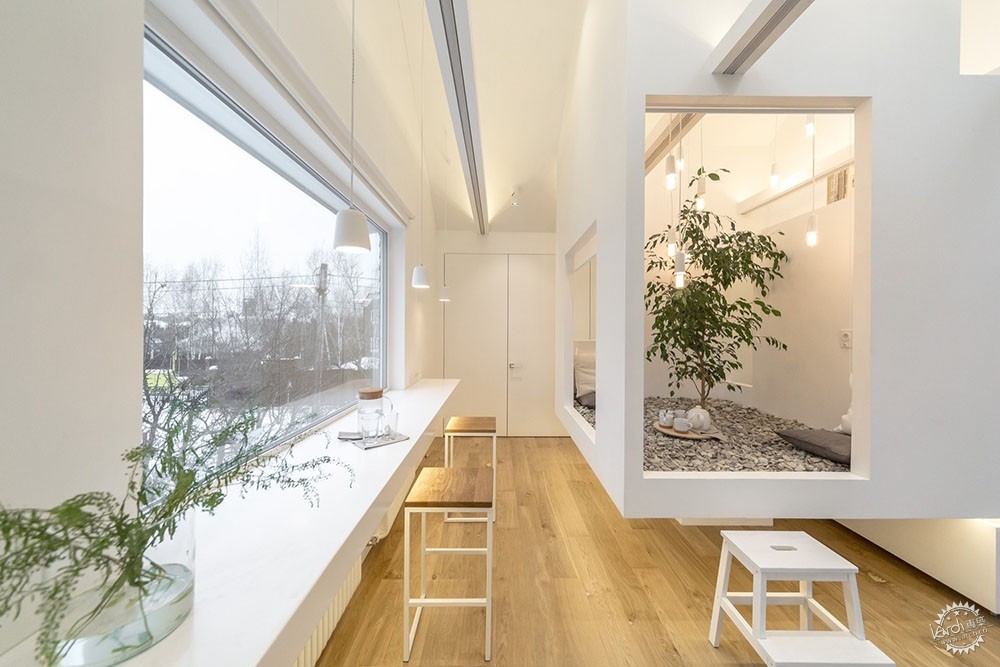
Living Space / Ruetemple. Image © Ruetemple
疫情期间建筑师居家工作小技巧
Tips for Architects Working At Home During COVID-19
由专筑网小R编译
新冠病毒的爆发让全球大约9亿人被迫居家,其中也包括建筑师和设计师,他们必须要居家工作,减少病毒的传播。对于建筑师来说,这是一个新领域,但是其实并不是,在家工作也可以很好地提升建筑师的技能、技巧,以及发展。
近年来,建筑师、制造商、创新者、教育家不断地开发出许多数字化交流建筑设计、理念、体验的新方式,现在,建筑师们也在逐步地适应远程工作这个新环境,届时,数字技术则成为了人们合作的关键要素,因此,小编们整理了一些小技巧,能够让建筑师们不至于在这场浪潮中乱了阵脚。
新冠病毒的传播带来了许多负面信息,人们无法控制病毒,但是能够控制自己的应对措施和反应时间,建筑师与设计师应该尽最大的努力,以乐观的态度面对未来,适应当前的状况,在疫情过后,才能拥有更加可控的现实。
The outbreak of COVID-19 has caused an estimated 900 million people around the world to remain at home. Among them are architects and designers who have been asked to work remotely to prevent the virus from spreading through the workplace. For many architects, this is undoubtedly a new territory. However, for ArchDaily, it is not, and we can assure you that it is possible not only to work from home, but to use this time to greatly enhance your skills, knowledge, and development as an architect.
Over recent years, we have had a front-row seat as architects, manufacturers, innovators, and educators have developed new ways of digitally exchanging architectural designs, ideas, and experiences. Now, architects are settling into their new remote working environment, where digital technology will be essential to continue to collaborate among peers and clients. In response, we have created a broad list of tips and resources that can help you find your feet, restore your confidence, and activate your imagination.
While the COVID-19 pandemic has brought a wave of sadness, uncertainty, and disruption, we want to remind you that although we have little control of this situation, we all have full control of our response and our time. We encourage all architects and designers to do what we do best: face the future with optimism and creativity, and adapt to your present circumstance so that when the coronavirus pandemic passes, which it will, we will emerge ready to design a better future.
首先是一些通用建议
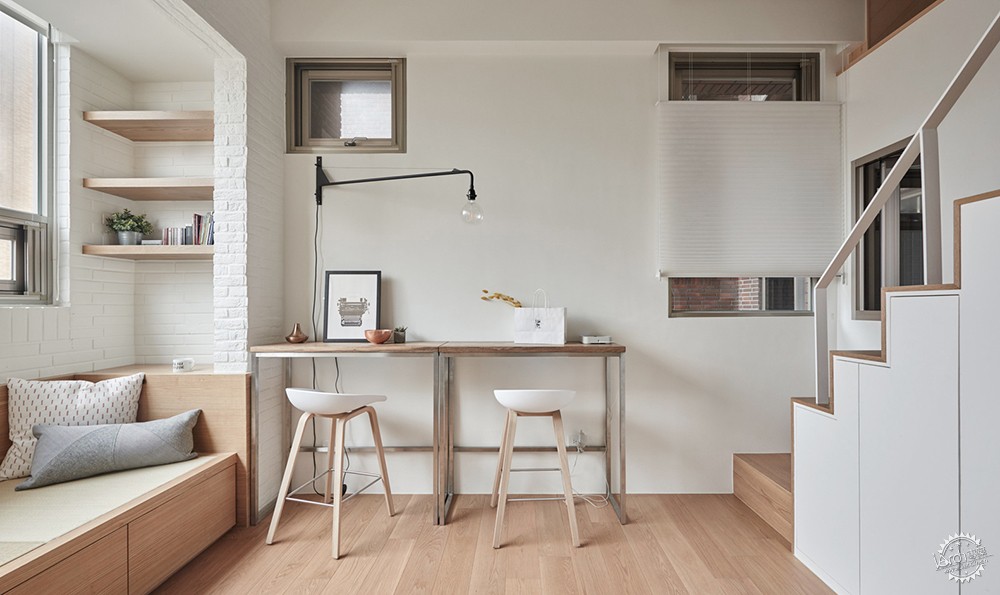
22m2 Apartment in Taiwan / A Little Design. Image © Hey! Cheese
遵循官方的战略:除了本文中的小建议,更加重要的是要遵循全球对于新冠病毒的抗疫建议与要求,充分阅读来自CDC、WHO,以及当地的官方最新建议。
控制新闻的阅读:重要的是保证新闻来源的可靠性,另外,过分地关注这些信息不仅会影响工作时间,甚至会带来不必要的恐慌,因此在工作时,就不要阅读这些新闻了。
保持日常工作:虽然是在家工作,也应当保持一定的工作效率、饱满精神,接下来会有更详细的说明。
保持关注也保持冷静:在这个非常时期,人们变得焦虑非常正常,本文的中心目标是强调人们在离开办公室的时间里,也要保持积极的态度,从而能够接受新技术与新知识,同时保持与家人朋友的友好联系。
To Begin: Some General Advice
Follow official guidelines: In addition to the useful tips in this article, it is important to follow the advice of central organizations involved in the global response to COVID-19. Read the latest advice from the Centers for Disease Control and Prevention (CDC), the World Health Organization (WHO), and your local public health authorities.
Limit your news diet: It is important to keep up to date on the latest developments from reputable sources. However, constant monitoring of news and social media will not only disrupt your workflow but needlessly increase anxiety. During your working hours, our advice is to avoid them entirely.
Maintain a routine: Even when working from home, a daily routine is important for maintaining your productivity, mental health, and happiness. We will offer more detailed tips on this below.
Stay connected and be a calming influence: It is only natural for people to become worried or anxious during a time of such unrest. The central goal of this article is to highlight how your time away from the office can be a major positive opportunity, allowing you to adopt new skills, habits, and knowledge. When keeping in touch with friends and family, do so in the same spirit of positivity and kindness.
保持工作流程:软件与技术
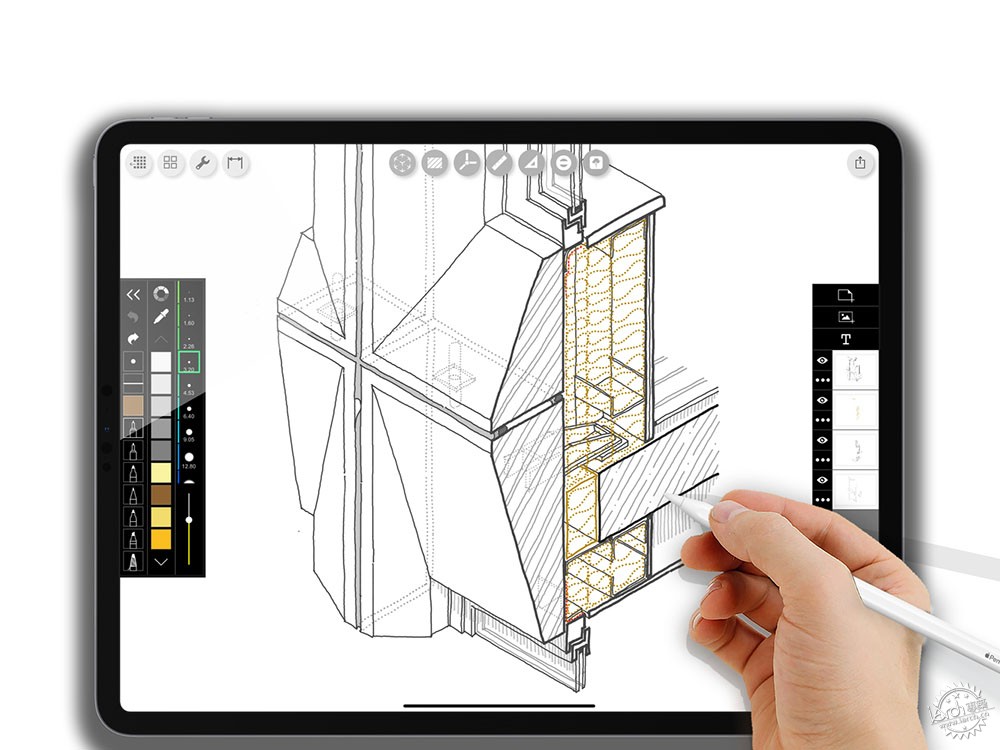
Morpholio Trace. Image © Morpholio
让项目来到线上:当前许多系统都有提供云端服务,例如Autodesk BIM 360和Graphisoft BIMcloud。BIM模型之间共享网络的替代方式是通过诸如Splashtop等应用程序将工作场所的电脑屏幕投射到家庭电脑中。
线上创意过程:今天许多应用程序都在重新创建定义物理办公设计过程的草图本,其中最主要的就是Morpholio,设计师可以通过其中的应用程序Trace和Board为客户的项目进行草图的绘制。由于新冠病毒的爆发,Morpholio公司为这两个应用程序设定了1个月的免费试用期。
将文件存储到云端:诸如Dropbox和Google Drive等平台能够安全地免费存储且共享信息,这些程序能够和电脑的文件资源管理器完美地结合使用。
共享文档:诸如Microsoft Office 365、ArchDaily、Google G-Suite等等可以让团队成员同时编辑文本文件、电子表格,以及演示文稿。
保持密切联系:在ArchDaily ,工作人员们会使用Slack通道来分享想法和组织策略,Slack的基本免费版本是很好用的一体化工具,人们可以插入自己的Google日历、Trello面板,甚至是生日列表。但是要确保Slack通道的界面正确,因为太多的渠道会让信息比较分散,甚至丢失,因此ArchDaily团队的策略是通过团队定位、团队目标来组织通道。Slack通道同样能够让团队成员发出状态信号,提醒其他人自己是否正在开会、外出、生病,还是空闲。
定期进行线上会议:在ArchDaily公司,线上会议通过Google Meet而进行,只需要使用Google账号即可。而针对视频会议,ArchDaily公司则会使用Zoom来创建更加流畅的界面。召开视频会议最为重要的目标是在同时之中保持联系感,同时避免误会的产生,因此需要最大程度地利用其优势。在ArchDaily公司,视频会议每天都会进行,有时只有2个人,有时有70个人。
管理项目与资源:在ArchDaily公司,工作人员们应用Trello来规划内容和想法,每个团队成员都能够了解到项目的所在阶段。在建筑设计中,Deltek和Newforma提供了更加深刻与广泛的方式来建构项目信息。
优化工具范围:以漏斗的精简方式进行文件的交流和分享,在办公室里,你可能通过交流、电子邮件、文件夹来交换信息,同样地,在线上环境中,可以将交流方式限制于一个文字平台、一个视屏平台,以及一个文件共享平台中。这样能够很好地减少麻烦,提升效率。
Maintaining Your Workflow: Software and Technology
Move your projects to the cloud: Today, many design systems offer cloud-based services, such as Autodesk BIM 360 and Graphisoft BIMcloud. An alternative solution for maintaining a shared network among BIM models is by mirroring your workplace computer’s screen with your home computer through apps such as Splashtop.
Move the creative process to the cloud: Today, many apps and programs are recreating the sketchbooks and sketch rolls that defined the design process of physical offices. Chief among them is Morpholio, whose Trace and Board apps allow designers to sketch, design, and present proposals for each other, and clients. As the COVID-19 crisis unfolds, Morpholio is offering a one-month free trial for both apps, which can be accessed here.
Move your files and folders to the cloud: Platforms such as Dropbox and Google Drive allow for free storing and sharing of information in a secure way, which integrates easily with your computer’s file explorer/finder window panels.
Prepare documents together: Use Microsoft Office 365 or, like ArchDaily, Google G-Suite to allow numerous team members to edit text files, spreadsheets, and presentations at the same time.
Stay in close contact: At ArchDaily, we use Slack channels to share ideas and organize strategies. A basic free version of Slack is still a useful ‘all-in-one’ tool, allowing people to plug in their Google calendars, Trello boards, and even birthday lists. Ensure that your Slack interface is properly structured – too many channels will mean information is too disparate and will become lost. Our strategy is to organize channels by team location, and team purpose. Slack also allows team members to signal their ‘status,’ informing others if they are in a meeting, away, sick, or available.
Hold virtual meetings regularly: At ArchDaily, virtual meetings are conducted via Google Meet, which simply requires a Google account to use. For more extensive video conferences, we use Zoom to create a smooth interface between all members. Holding video meetings is essential for maintaining a sense of community among colleagues and avoiding misinterpretation, so use them to their maximum effect. At ArchDaily, video meetings take place every single day, sometimes with two people, and sometimes with 70.
Manage your projects and resources: At ArchDaily, we use Trello to map out the development of content and ideas, allowing each team member to understand what stage each project is at. In architectural practice, Deltek and Newforma offer a more in-depth, extensive means of structuring all project information and exchanges.
Keep your tool range to a minimum: Funnel communication and file sharing through as few avenues as possible. In a physical office, you would likely only exchange information through talking, emailing, or folder exchange. Likewise, in a virtual environment, aim to limit communication channels to one text-based platform (such as Slack), one video platform, and one file-sharing platform. This will minimize confusion and miscommunication, and enhance productivity.
创建健康的工作与生活的平衡
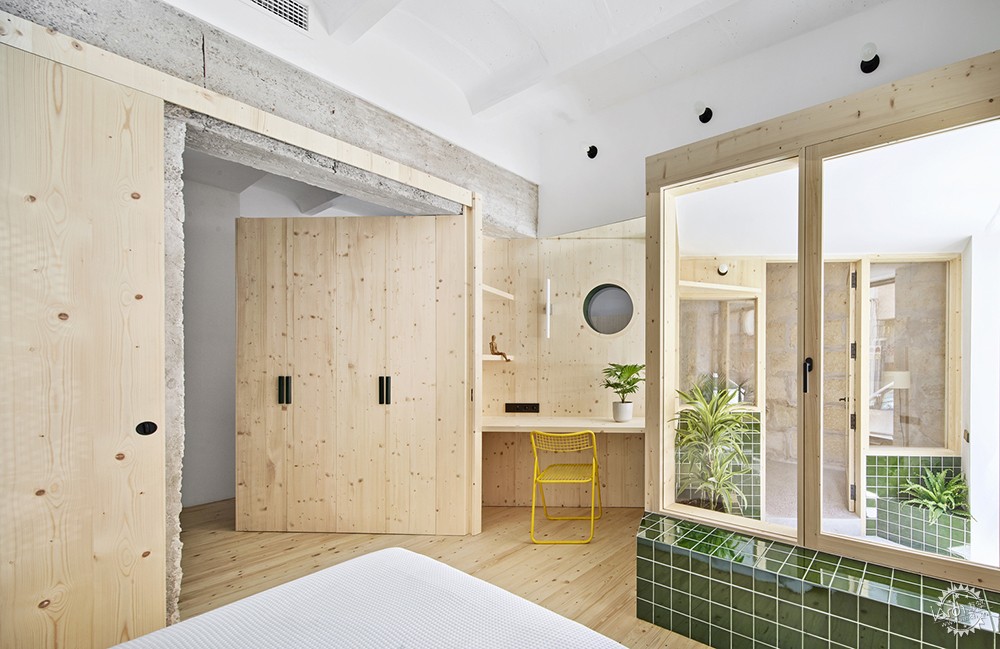
Palma Hideaway House / Mariana de Delás. Image © José Hevia
来自范例的灵感:在日常生活的组织中,可以看看Info We Trust中的信息,其中描述了世界上优秀人才的生活方式。
建立专门的工作区域:可以花一点时间建立专门的家庭办公区,为了提升效率,可以购买一个大屏幕,但是如果预算有限,也可以考虑准备两个显示器,这样能够提升工作效率,但是如果你需要再加工作很久,那么就可以准备好一点的鼠标和键盘,同时注意人体工程学,比如舒适的座椅等等。另外还可以把电脑屏幕抬高一些,大概是到眼睛的高度,重要的是,确保工作空间通风采光良好,关于家庭办公空间的设计也可以看看相关案例。
重新评估工作时间:在家里工作意味着不需要长时间的通勤,也没有午休的限制,所以你可以检查一下工作流程,也许你能够花5个小时就完成平时8个小时的工作,因此可以利用多余的时间来学习一下新软件,或者研究其他内容,查看相关资源等等。
不要分散注意力:可以使用Pomodoro技术,将日程表分为以25分钟为单位的工作时间块,然后再加上5分钟的休息时间,如果你常常被手机所打扰,那么你可以把手机调整为飞行模式,然后放在你看不到的地方。
找到你的放松方式:我们需要面对现实,我们常常在上午需要面对一整天的辛苦工作,晚上以放松的时刻结束一天,那么在家工作的时候,工作与生活之间的过渡就尤为重要,可以学习瑜伽缓解压力和焦虑。
保持活跃:根据个人情况看看是否能够出门锻炼,为了解决这个问题,《纽约邮报》公布了一份在疫情期间可以居家锻炼的健身应用程序,当然可以话还是走出家门散步或者跑步比较好。
转换思维:在家工作的时候,规律很重要,尽量在核心工作时间保持高效,但是在离开工作的时候也可以适当地转换思维。因此可以看看《纽约时报》推荐的这份清单,当你不工作的时候,可以读读看看。另外还有一些建筑相关内容,因此可以看看YouTube建筑频道。
Creating a Healthy Work/Life Balance
Take inspiration from idols: in organizing your daily routine, take a look at the engaging graphic by Info We Trust, which depicts how the world’s most brilliant people scheduled their days.
Establish a dedicated work area: Take the time to set up a dedicated home office. To enhance productivity, consider acquiring a large screen such as a TV, or if budget allows, two monitors, to allow for a smoother workflow. If it appears you will be working from home for more than a few weeks, also consider investing in a good keyboard and multi-function mouse. Be conscious also of ergonomics, finding a comfortable chair with back support. As part of this, prop up your screens to eye level using either a stand or books. Most importantly, ensure you set up your space in a well-ventilated area, which has access to natural light. Find some inspiration from our recent article on 35 home working spaces.
Re-evaluate your working hours: working from home means no long commutes and no strict one-hour lunch break. Examining your workflow, you may find it possible to accomplish your tasks in 5 hours rather than the traditional 8 hours mandated by office hours. Use this “new time” as an opportunity to learn new software, study a topic that will benefit your performance, or explore some of the other resources in this article.
Mitigate against distractions: Consider using the Pomodoro Technique by breaking your schedule into 25-minute intense work blocks, divided by 5-minute breaks. If you find yourself frequently distracted by phones and the internet, then place your phone in flight mode/sleep mode, and place it out of your eye line.
Find your zen: Let’s face it, we have all fantasized about being ‘that’ person who mediates every morning in preparation for the tough day ahead, or practices yoga in the evening to mark the end of a long day. When working from home, this point of transition between work and life is more important than ever. Check out EkhartYoga’s free yoga and meditation classes, designed to relieve stress and anxiety.
Keep active: Depending on your location, it may not be possible to leave your home for exercise. To address this, The New York Post recently published a list of at-home fitness apps to use during the COVID-19 outbreak. If possible, we also recommend switching off from work by leaving the house, going for a walk or run, and interacting with nature.
Switch off: Discipline is important when working from home. While it is vital to maintain productivity levels during your core work hours, it is equally important to detach from work when needed. We recommend this list by The New York Times on what to watch, read, and listen to when in need of a distraction. For some architectural intrigue, also check out our feature on this excellent abandoned architecture YouTube channel.
释放思维:在线学习
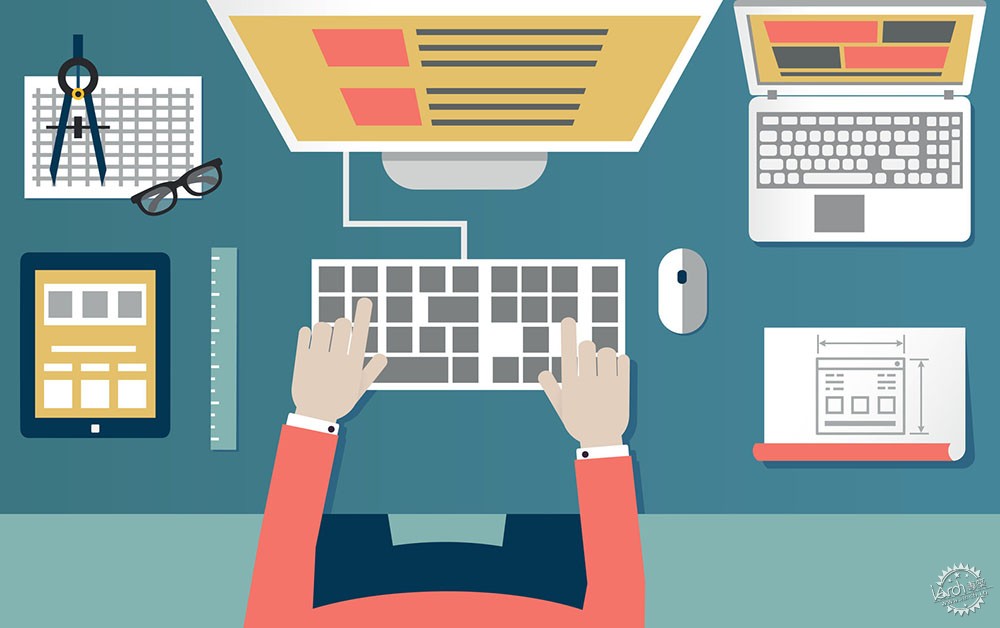
© Shutterstock. © Max Griboedov
学习新软件:能够更好地控制你的日常工作,现在可以好好学习一下各种软件,相关信息可以看看我们曾经发表的文章。
云参观博物馆:许多博物馆已经关闭,但是它们的展品仍然能够在线参观,谷歌艺术和文化公司为全球数十家博物馆提供云参观服务,而Guggenheim与 Smithsonian国家自然历史博物馆也提供云体验服务,在欧洲,Rijksmuseum博物馆也能够云体验。
参加线上课程:去年我们公布了12个在线课程,其中包含一系列与建筑相关的内容,另外还有许多顶尖学府面向公众开放的在线课程,例如来自哈佛大学的“建筑想象”。
学习施工与材料知识:除了建筑相关的线上课程,还可以学习建筑和施工材料,如果你一直想了解施工艺术、结构、材料方面的内容,那么这些课程就是为你量身打造。
提升绘画技巧:在一个月的研究当中,小编们发布了一篇文章,详细地介绍了YouTube中的绘画课程。
听听顶级建筑师的采访:虽然Louisiana现代艺术博物馆已经闭馆,但是它们的采访仍然非常精彩,在我们的网站里可以找到许多顶级建筑师的访谈内容。
观看TED演讲:在过去的纪念里,我们强调了优秀建筑师TED演讲的优点,甚至也曾经采访了TED演讲的创始人。因此,通过大约20个TED演讲可以了解建筑对于世界的影响。
了解远程工作的更多信息:Linkedin Learning制作了一项在线工作的优秀课程,提供了对于适应新环境所需的小技巧,也描述了虚拟交流工具。
Opening Your Mind: Online Learning
Learn new software: With more command over your routine, now is the perfect time to integrate new software into your arsenal. Check out a previous article of ours that offers the best places to find software tutorials.
Virtually visit a museum: While many museums have closed to the public, their exhibits can still be explored virtually. Google Arts and Culture are offering virtual tours of dozens of international museums, while the Guggenheim and Smithsonian National Museum of Natural History are also offering virtual experiences. In Europe, the Rijksmuseum has also established a virtual experience.
Take an online course: Last year, we assembled a list of 12 online courses covering a range of subjects related to architecture. Check them out again here. There is also a range of online courses from top universities available to the public, such as the ever-popular Harvard course “The Architectural Imagination”.
Learn more about construction and materials: In addition to our coverage of online courses related to architecture, we created a specific list of excellent online courses that focus on materials and construction. If you've always wanted to understand more about construction processes, structures or materials, this list of online courses is for you.
Improve your drawing skills: During our month-long study on Representation, we produced an article detailing the best drawing tutorials on YouTube. Check it out here.
Listen to interviews from top architects: While the Louisiana Museum of Modern Art is closed, their impressive collection of architectural interviews is still very much operational, courtesy of the Louisiana Channel. Check out our highlights here. More standout interviews can be found on our list of the top architecture interviews of 2019.
Watch architectural TED Talks: Throughout the years, we have highlighted numerous TED Talks that are particularly relevant to architects – we even interviewed the founder of TED last year. Recently, we created a list of 20 such TED Talks that show how architecture can change the world.
Learn more about remote working: Linkedin Learning has produced an excellent course on working remotely, offering tips on adjusting to your new environment, and an overview of virtual communication tools.
来自建筑界的回应
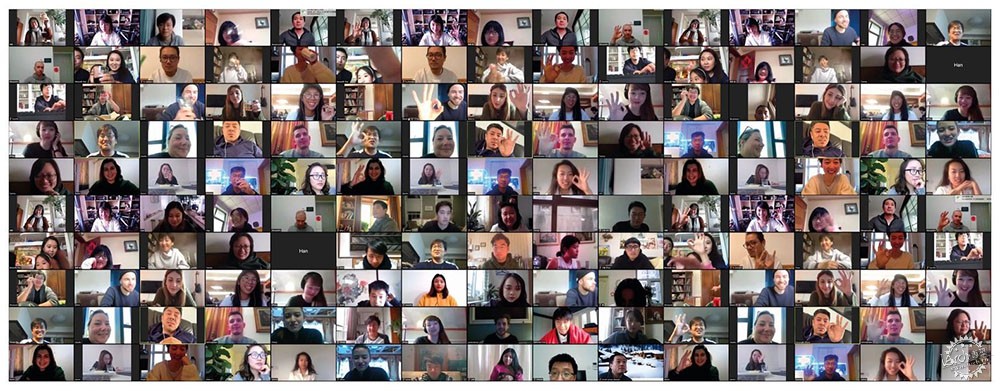
MAD Architects holding a video conference during the outbreak. Image © MAD Architects
GBBN:“技术方便的改变非常容易,北京工作室的沟通都通过微信来解决,这个平台能够让项目团队之间进行会议、交换信息、屏幕共享、发送文件、视频通话,因此项目团队的交流不太会中断。和客户的交流则通过Zoom,这款程序曾经没有被广泛应用,如果人们必须要来到办公室,那么我们会制定一个日程表,保证每次只有一个人在场,尽可能减少接触。”
MAD建筑事务所:“北京的工作室里大概有100人,有很多项目在同时进行,而工作人员分布在不同的时区里,这是一件头疼的事情。首先,我们要确保每个人所在的地方都有网络,然后可以通过远程桌面查看文件,每天的交流和会议会通过Zoom来进行,后来我们渐渐适应这种模式,这对建筑事务所来说非常重要。除了工作,我们十分怀念彼此相处的时光,在2月中旬我们举办了‘重返工作的云时光’,70多个人通过Zoom会面,同时向坚守第一线的医疗团队致敬,我们记录了‘快乐云时光’的视频,《华尔街日报》当时也报道了,这两个月的时间我们非常珍惜,但是也期待未来的见面。”
Carlo Ratti建筑事务所(都灵与纽约工作室):“‘不能浪费危机时间’,这句话来源于芝加哥前任市长Rahm Emanuel,我们是积极响应社会变革的设计事务所,新冠病毒的蔓延所带来的各种限制让我们制定有限的工作列表,在线工作时,我们会通过Skype或者Zoom来进行,但是确实这样不如面对面那么容易理解对方的想法,我们的工作人员分散在各个大洲和不同时区,但是我们所面临的是另一个巨大挑战,那就是如何通过建筑师的策略来帮助社会缓和当前的危机状况。CURA项目就是工程师、医生、军事专家、非政府组织的共同努力成果,这也是我们努力的方向。”
Henning Larsen:“舒适的工作场所要远离电子产品的干扰,对我而言,我会在上午保持工作效率,这样效果更好,那么这就需要穿着舒适,不要出汗,吃一顿健康的早餐,按照日常的工作时间,就团队来说,尽量清晰地沟通,保持团队精神,相互了解彼此的工作进程,通过电子邮件的形式传递信息和文件,如果网络不佳或者是无法屏幕共享,那么就可以截屏发送给他人,从而保持高效的交流,要记住的是,这个时候要保持冷静,不要惊慌。”
Mizzi工作室:“现在是艰难时期,但是我会尽量充分利用这段时光,建筑师能够准时到家?这也太疯狂了,现在我能够每天晚上帮孩子们洗澡,我从未如何长时间地和家人在一起。”
SOM:“尽量多学习,保持灵活性,常常沟通。关于新冠病毒,还有很多未知,但是领导者就需要制定一系列的工作计划,确保各个部门能够顺利运营,并且保持乐观的心态,因此我们的沟通方式的选择非常谨慎,因为这对于很多人来说都是焦虑的时期,我们常常和团队联系,接受反馈和调整,和人们分享各项最新内容,在这个非常时期,我们要保持信任,保持和员工、客户的沟通顺畅,但是更重要的是,我们也要有一颗乐观的心。”
福斯特建筑事务所:“我们已经居家工作了一段时间了,我们的亚洲工作室做得很出色,香港、深圳、上海、北京等办公场所都保持开放。我们90%的伦敦团队能够保持居家的高效工作。”
Gensler:“外部的流动是一件好事,这种流动性、选择性、虚拟合作在目前的危机中至关重要,我们可以组织居家办公的策略,并且迅速地实施,近几十年来,技术、管理、工作模式都发生了很大的改变,虚拟云办公成为了可能,我们能够在任何地方工作,这种全新的模式能够帮助事务所和员工们在这场危机中仍然保持办公效率。”
S3DA设计事务所:“如果没有新冠病毒,那么远程办公可能还不会这么普及,它不仅仅是一项安全措施,它更有诸多好处,例如可以减少通勤成本,节省大量的时间和碳排放,虽然我们不得不居家工作,但是也必须要承认它的优势。”
How the Architectural Community Has Responded
GBBN: "The technological side of the transition was surprisingly easy. So many of the Beijing office’s functions are integrated into WeChat—a platform that allows for spontaneous meetings between project teams, messaging, screen sharing, file transfers, and phone calls—that communications between project teams were only minimally disrupted. Meetings with clients began being held on Zoom, which had not been widely adopted previously. When people did have to stop by the office, GBBN minimized risk of exposure by creating a schedule to ensure that only one person was there at a time."
MAD Architects: "We have around 100 people in our Beijing office. With so many projects going on, and staff in different time zone, it was extremely challenging. First of all, we made sure each of us has the Internet and computers at the place we’re staying. Then we access the office files via remote desktop software. Our daily internal and external meetings are replaced by zoom e-meetings. It worked. Just face-to-face communications were not there anymore, which is extremely important for architecture firms. Besides working, our colleagues miss the time we’re with each other. The bonds are still strong. We had our “back-to-work cloud happy hour” in mid-February. 70 of us showed up on zoom, caught up with each other, and paid tribute to the medical teams in the then hard-hit area. We had this video of the “cloud happy hour” and got spotted by the Wall Street Journal. We value these two months but look forward to meeting with each other again very soon."
Carlo Ratti Associati (Turin + New York): "Never let a serious crisis go to waste" is what Rahm Emanuel, the former mayor of Chicago, said a few years ago. As a design office committed to making a positive social change, the constraints brought forward by the COVID-19 pandemic are compelling us to set up new priorities. Talking about remote working: it is not always easy to understand each other's ideas during a crowded Skype or Zoom meeting - especially when people are scattered around three continents and multiple time zones. Still, the real challenge we are facing at this time is another one: how to use our skills to contribute help society overcoming the current crisis. The open-source project CURA (https://curapods.org/), which is the result of an interdisciplinary task force involving engineers, doctors, military experts, and NGOs, is how we are striving to move in that direction."
Henning Larsen: "Set up a comfortable workplace, preferably away from the fridge, tv, or other distractions. For me, it works better to keep the morning routine as if I was going to the office. So that means: get dressed comfortably, but not in sweats. Have an early, healthy breakfast, and start work at a normal hour. As far as teamwork goes, communicate clearly and as often as necessary. And do your best to keep up your team spirit! Update each other on who is doing what, and update everyone when you have completed a task. There will be a lot more emails than usual. If you are having issues with your network and have trouble sharing your screen while in a call, send quick screenshots to everyone to keep the flow more efficient. And remember. Stay calm, get up, walk around, and don’t panic."
Mizzi Studio: "Despite the fact that these are hard times, my biggest tip would be to try make the most of this unique period. Architects arriving home on time? How crazy is that!.. Now I manage to give my children bathtime every night and as a result have never been closer to my family. Stay safe!"
SOM: "Stay as educated as you can and be proactive. Be flexible, communicate often, and listen to your people. There is so much unknown about Covid-19, but it is the job of a leader to plan for a range of scenarios and make sure all preparations have been made, and lead with a spirit of optimism. To that end, we’ve taken a very deliberate approach to communication as we work remotely, knowing that this is an uncertain and anxious time for a lot of people. We’re checking in with our teams regularly, taking feedback and making adjustments, and sharing updates from every city and every office, with everyone in the firm. In challenging times, our focus is on maintaining trust and keeping lines of communication open with our teams, collaborators, and clients. Perhaps most important, though, is that we don’t forget to take time to laugh and have fun – we all need a bit more joy right now."
Foster + Partners: "We have been trialing home-working for some time – our Asia offices have all done it successfully, they are now open again in Hong Kong, Shenzhen, Shanghai, and Beijing. Over 90% of our teams in London are currently working efficiently and collaboratively from home."
Gensler: "External mobility is a good thing as well. That mobility, choice, and virtual collaboration are invaluable in today’s health crisis. As we have seen, organizations are able to announce a work from home strategy and implement it immediately. This is because of the three-decade transformation of work, which created the technologies, management styles, and work styles that have enabled a virtually connected organization. We are a “work from anywhere” culture, and this new paradigm will help companies and workers stay productive in the office and at home in the face of this health crisis."
S3DA Design: "Remote work would not be a priority if it was not for the coronavirus. But besides being a safety measure, remote work has many benefits too. Since there is no inspection, it can cut the costs of onsite visits. It can also be a huge time saver, as there will be no need for traveling. Simultaneously, this leads to less carbon emission. While remote work has been forced upon us, we should also appreciate its benefits."
|
|
